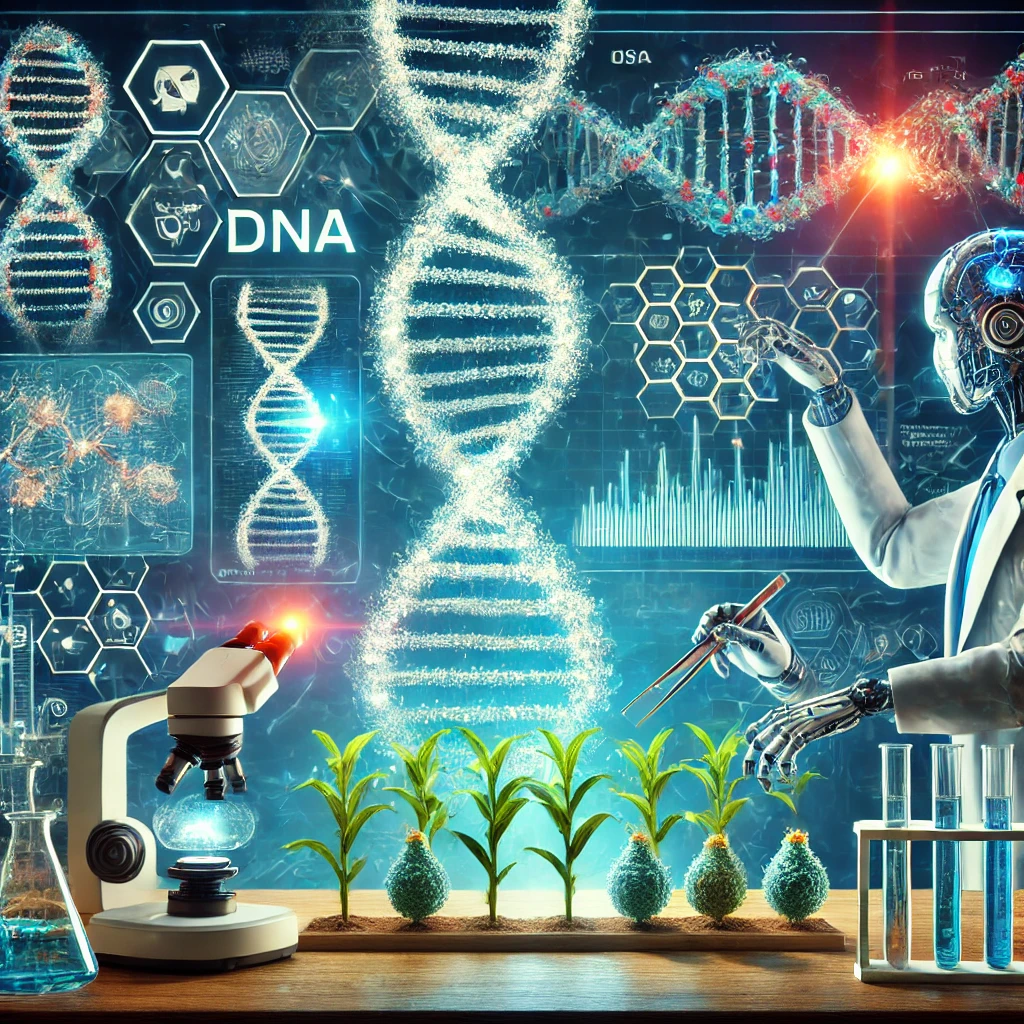Genetic Engineering

Picture Credit – ChatGPT
What is genetic engineering?
Genetic engineering, also known as genetic modification, is a scientific process that involves altering the genetic material (DNA) of an organism to achieve desired traits or characteristics. This technology has applications across various fields, including agriculture, medicine, environmental science, and research.
Key Methods of genetic engineering
- Recombinant DNA Technology : This is the most common method, where a desired gene from one organism is inserted into the DNA of another organism, creating a new genetic combination.
- CRISPR-Cas9 : A highly precise and efficient technique that allows for targeted editing of the DNA at specific locations. It can delete, insert, or modify genes with minimal unintended effects.
- Gene Cloning : In this process, a gene of interest is replicated multiple times by inserting it into a host organism, such as bacteria, which then reproduce, creating many copies of the gene.
- Gene Silencing (RNA Interference) : This method reduces or “silences” the expression of specific genes by introducing small RNA molecules that interfere with the mRNA of the target gene, preventing it from being translated into a protein.
- Gene Therapy : Used in medicine, this method introduces healthy genes into a person’s cells to replace faulty or missing genes, with the goal of treating genetic disorders.
Applications of Genetic Engineering
- Medicine : Used in gene therapy, creating medicines like insulin, and developing treatments like CAR-T cell therapy for cancer.
- Agriculture : Produces genetically modified crops that are resistant to pests, diseases, and harsh environmental conditions.
- Industry : Used to engineer microorganisms that produce biofuels, clean up oil spills, or create biodegradable plastics.
- Research : Enables scientists to study gene functions, model diseases, and develop new biotechnologies.
Benefits of Genetic Engineering
- Increased Crop Yields : GM crops can significantly boost agricultural productivity, helping to meet the food demands of a growing global population.
- Disease Resistance : Genetic engineering can create plants and animals that are resistant to diseases, reducing reliance on chemical treatments and improving overall health and productivity.
- Improved Nutritional Value : Biofortified crops can help address malnutrition and vitamin deficiencies in vulnerable populations, contributing to better public health.
- Medical Advancements : Genetic engineering has led to the development of targeted therapies, vaccines, and advanced treatments, revolutionizing the field of medicine.
- Environmental Benefits : Reduced use of chemical fertilizers and pesticides can lessen environmental pollution and promote sustainable agricultural practices.
Future Prospects of Genetic Engineering
- Precision Medicine : Genetic engineering is expected to lead to personalized medicine, where treatments are tailored to an individual’s genetic makeup, improving treatment efficacy and minimizing side effects.
- Agricultural Innovation : Continued advancements in genetic engineering may yield crops that can withstand extreme environmental conditions, such as drought or flooding, addressing challenges posed by climate change.
- Synthetic Biology : The intersection of genetic engineering and synthetic biology may allow scientists to design entirely new organisms with specific functions, leading to innovations across various sectors.
- Regulatory Developments : As the technology evolves, regulatory frameworks will need to adapt to ensure safety while promoting innovation and public trust in genetic engineering.
- Public Acceptance : Building public understanding and acceptance of genetic engineering is crucial for its successful application. Open dialogue and education about the benefits and risks will play an important role.
Genetic engineering is a transformative technology with the potential to address critical challenges in food production, healthcare, and environmental management. While it offers exciting opportunities, it also requires careful consideration of ethical implications and safety concerns. As research continues and public discourse evolves, genetic engineering may play a vital role in shaping a sustainable and healthier future for humanity.
Technical content writer with data scientist, artificial intelligence, programming language, database. He has a bachelor’s degree in IT and a certificate in digital marketing, Digital transformation web development android app development He has written for website like Boomi techie, tech mantra, information hub, Tech all





